Although BN's popular vote in yesterday’s Sarawak election dropped significantly from 63 percent to 55 percent, preliminary analysis show that this was mainly contributed by a swing in Chinese and Bidayuh areas.
Ibans, who form the bulk of the total voters, are still very much unpredictable.
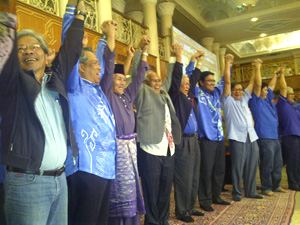 Comparing the results of some 50 native-majority rural constituencies won by BN with the 2006 state poll results, Pakatan had generally reduced BN's majority in half of the seats.
Comparing the results of some 50 native-majority rural constituencies won by BN with the 2006 state poll results, Pakatan had generally reduced BN's majority in half of the seats.
The remaining half saw even bigger victories for BN.
In the Bidayuh-majority seats, which are concentrated around Kuching, BN's majority was also reduced, but not significantly enough for Pakatan to wrest them from the ruling coalition.
On the other hand, Malay and Melanau seats remained BN's fortresses. PKR and PAS made inroads in several seats as a result of their more popular candidates and aggressive campaigning, including in Tanjong Datu, Satok, Kalaka and Beting Maro.
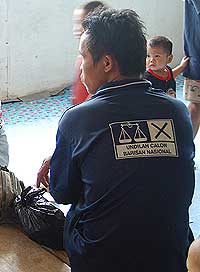 Meanwhile, Iban voters in the interior showed a bipolar swing.
Meanwhile, Iban voters in the interior showed a bipolar swing.
In the Iban constituencies around the small townships of Sri Aman and Betong, including Balai Ringin, Bukit Begunan, Batang Ai, Engkilili, Bukit Saban and Saribas (with a Malay/Melanau-majority but significant Iban presence), BN saw a great surge in its majority over the opposition.
Seats that sprang a surprise in favour of the opposition were Simanggang and Layar. The former was due to the overwhelming Chinese votes given to DAP, and the latter was because of PKR's candidate Stanny Embat, who has been working on the ground since last year.
Understanding voting patterns
However, the Iban voters in the more interior areas along the Rejang River, such as Tamin, Kakus, Katibas, Machan and Baleh, punished BN by slashing its majorities. They even chose to vote out BN in Pelagus in favour of Independent candidate George Lagong, though there were other factors at work there.
This outcome has been a complete contrast to the norm of Malaysian politics.
There has generally been a tendency for voters in areas closer to towns, which enjoy better infrastructure and wider penetration of information, to have higher political awareness and be more attuned to national issues.
On the other hand, in the more under-developed interior areas - deprived as they are of basic facilities such as treated water, electricity, roads and medical service - financial goodies, aids and the services of elected representatives have greater utility.
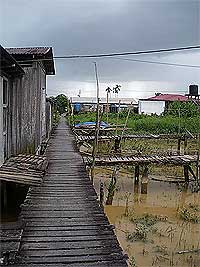 These seats, where money politics and last-minute development promises run rampant, remained BN strongholds.
These seats, where money politics and last-minute development promises run rampant, remained BN strongholds.
But the results showed otherwise: voters in the semi-rural areas gave BN larger support but those in the more interior regions swung their support to opposition, resulting in BN's lower majority.
To understand such an outcome, one needs to look beyond the general trend in the peninsula and understand the complexity of Sarawak politics.
Instead of trying to generalise the voting behaviour based on geographical differences, one should consider the different trends in these two regions as merely a coincidence because, unlike the Chinese, Iban politics does not have a statewide homogeneous character.
The is because Ibans' voting behaviour largely hinges on two factors - local issues and the impact made by the individual candidates on the areas concerned, instead of state-wide issues such as corruption and the unfavourable perception surrounding Chief Minister Abdul Taib Mahmud 30-year term.
These two factors are highly dynamic and vary from one area to another. Local issues in one village may differ completely from that in neighbouring one across a river, thus producing different voting patterns in different areas.
Nevertheless, both elements are interconnected.
Representatives who are seen as capable of addressing local issues of concern would get support.
Where incumbents had failed to perform in their previous term, votes cast for the opposition were generally in protest, rather than out of genuine support for the opposition.
Family politics also play a crucial role in local politics.
It is not uncommon for a candidate to win a seat because of strong family networks within the constituency or the contributions and services by family members - even forefathers - to the people there.
Many elected representatives are descendants of respectable politicians.
Neutralising Pakatan
Thus, while Pakatan
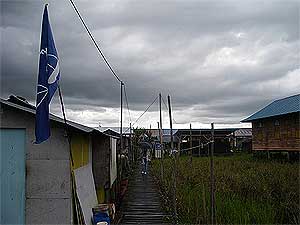 sought to capitalise on local issues during its campaigns in rural the constituencies, BN neutralise this strategy by sending Prime Minister Najib Abdul Razak and his cabinet members on statewide visits to provide last-minute promises and quick-fix solutions.
sought to capitalise on local issues during its campaigns in rural the constituencies, BN neutralise this strategy by sending Prime Minister Najib Abdul Razak and his cabinet members on statewide visits to provide last-minute promises and quick-fix solutions.
When the opposition struck back by highlighting many of BN's unkept promises, the visits by Najib - magnified by the mainstream, pro-establishment newspapers - managed to convince the fence-sitters.
Understandably so, given government propaganda serving as the only constant source of information for natives in longhouses. The BN is thus seen as the only party that can improve their livelihood.
Yesterday's results also indicated that issues such as religious freedom, corruption and native customary rights land did not resonate with Iban voters.
 While there is disgruntlement among natives who feel they have been shortchanged, there were also fears that by voting in the opposition would jeopardise the status of their lands, many of which are involved in joint-venture programmes with government agencies or private companies that are linked with figures in the ruling coalition.
While there is disgruntlement among natives who feel they have been shortchanged, there were also fears that by voting in the opposition would jeopardise the status of their lands, many of which are involved in joint-venture programmes with government agencies or private companies that are linked with figures in the ruling coalition.
Hitting home
Religion and issues of corruption are therefore seen as being less important compared with issues like how much their joint venture programmes would pay in dividends next month or whether there would be enough rain in the coming weeks to fill up their water tanks.
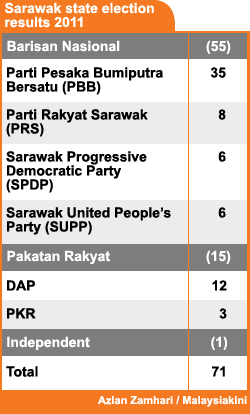 It is still a long way for Pakatan to pose a real challenge to BN in the interiors of Sarawak.
It is still a long way for Pakatan to pose a real challenge to BN in the interiors of Sarawak.
The only way to build their base is through consistent groundwork, from the very basics of political education for voters on how parliamentary democracy functions, to empowering the people against political inducements and intimidation.
A source of support that Pakatan has yet to tap for such purposes is the growing number of young voters in the semi-rural ares. Many of these more educated, Internet-savvy youths are not registered as voters.
Pinning hopes merely on the ‘magic’ of creative and aggressive campaigns launched a mere weeks before an election does not work in the interior regions.
Should Najib decide to call for an early general election in the next six months, Sarawak is largely expected to remain as BN's fixed deposit, even if now comes with a lower interest rate.

